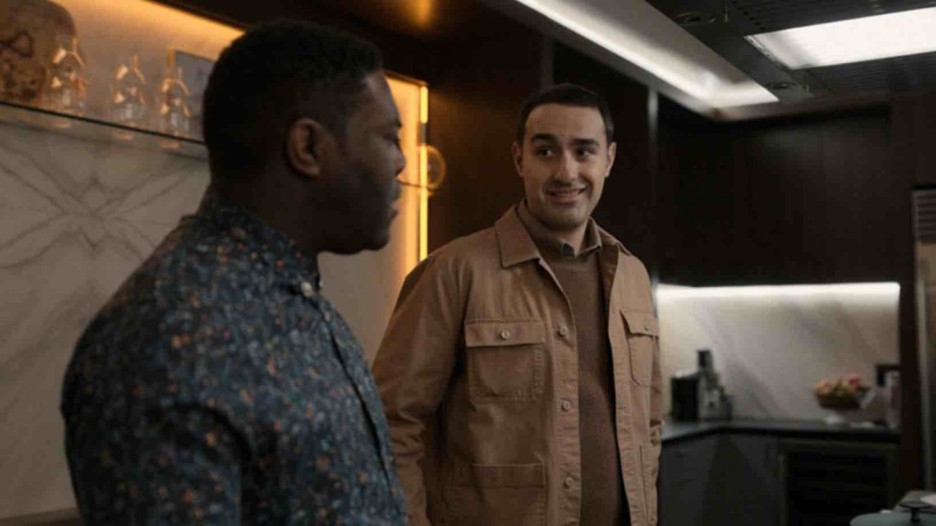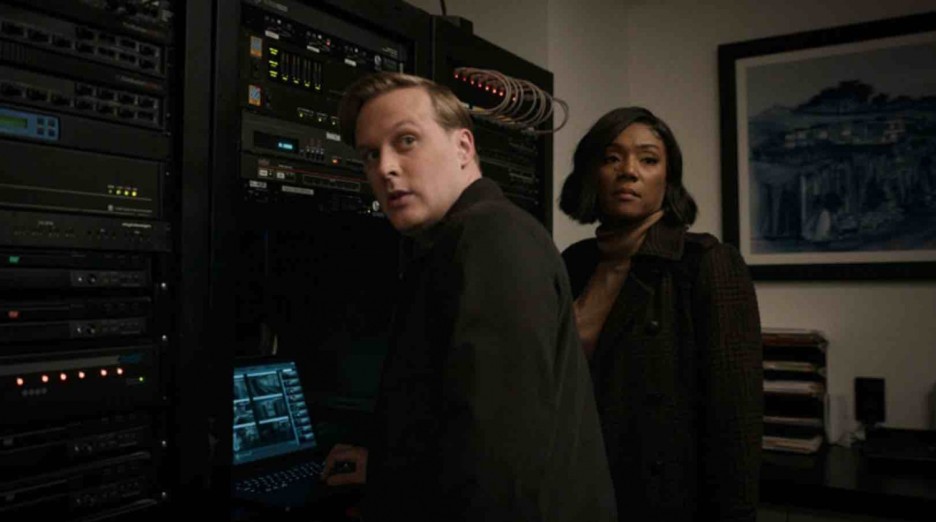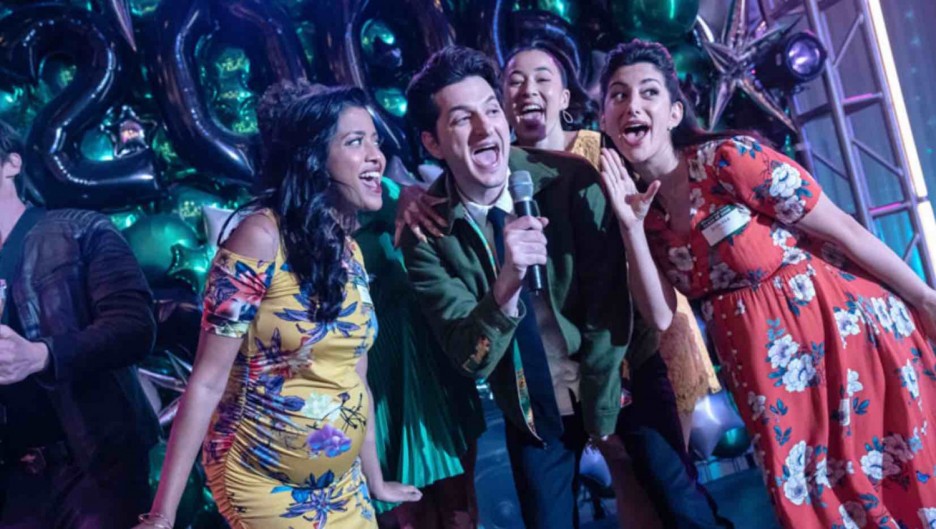HOT TAKE! 'The After Party' Is The Most Empathetic Show Now Streaming! (Yes, Even With the Murder)

The After Party is all about empathy.
Is that a weird thing to say about a murder-comedy series? Yes, but trust me.
The After Party is a new murder-comedy series that premiered today on Apple TV+. They also decided to release the first episode on YouTube to make sure more people get a chance to see it - there is even a watch party tonight on Twitter with the cast and creators of the show at 5PM PT (that's 2PM EST). The team wants to make sure that everyone who wants to has a chance to come to this party!
(If that doesn't perfectly set up my thesis that this show is one of THE most emphatic currently streaming, I don't know what will.)
In fact, watch it right here and then read the rest of this! I'll wait!
ISN'T IT AMAZING?!?!
Now, on to my next point.
Xavier, played by Dave Franco, is killed at the after party of his high school reunion. In a modern Agatha Christie style turn, everyone at the party is a suspect. Detective Danner, played by Tiffany Haddish, interviews everyone, trying to solve the whodunit.
Each person expertly tells the story from their own point of view. In The After Party however, each person's point of view is set within the confines of a different film genre; which is, without question, one of the most brilliant depictions of the human mind I've ever seen.
We are all the stars of our own movie, in our heads.
Our friends and families and enemies and acquaintances are the characters. If you live your day in the same exact way as five other people, none of you will walk away having processed the same day. The way we each, as people, process the world around ourselves is infinitely unique.
Everyone's brain movie is a different genre, and, therefore, we process things differently. This difference in genre is a main reason we often have trouble communicating with each other, but when we learn to empathize and watch another person's movie, we are able to build a far more stable ground of communication and understanding. The After Party does an excellent job exemplifying this through its method of storytelling.

From the first moments of the show, we see Detective Danner, very excited to hear everyone's story. She comes in knowing full well that each will be a bit different from the last. Her delight in "watching" the various versions sets an open and unbiased point of view, from which all of us are more open to listening to everyone's side of the story equally.
Non-judgemental listening is crucial in our fight to better communicate and understand each other
This article on HSR Psychology emphasizes the importance of non-judgemental listening:
"Non-judgemental listening is about trying to really understand the other person. It is about going beyond just hearing the words spoken and involves understanding exactly what the other person is saying."
This requires both parties coming in with an open mind, AND seeking to understand the way in which another person's mind operates.
The After Party emphasizes the difference in the way everyone processes information, and the importance of understanding the way different people's brains operate, through the use of the multiple genres and the non-judgemental listening skills of Detective Danner.
When you and a friend share a memory that may be slightly different, it does not mean that one of you is lying. It means that one of you processed the situation differently than the other.
By coming to recognize these differences in processing, we are led to an appreciation that everyone thinks a little differently than we do. The After Party helps to encourage us to work harder to see the world from another person's perspective.

While it is important to try to understand the way others think, people are infinitely complex and difficult to understand. Movie tropes, however, remain relatively standard. Through the movie-genre vehicle, we are able to recognize the phenomenon we have all experienced: looking at something with a friend, but both of your remember it differently.
An article from 2018 on The Conversation explains this phenomenon. It reads:
"Perception is strongly affected by what we have experienced in the past, and our expectations of what we might experience in the future. These effects are called top-down processes, and have a big impact on whether we successfully encode a memory."
Because the way that we perceive different moments or generate memories is so closely linked to our own past experiences, no two memories are likely to be exactly the same.
In The After Party, differing movie genres are used as a vehicle to explain the experience.
If one person is viewing their life as a rom-com while another is looking at it like an artsy indie film, different moments will read in different ways. In a comedy, if someone is unable to open a door, it is sure to lead to hilarious shenanigans. In a horror movie, a locked door probably means that death is imminent.
The After Party brilliantly points out that the genre in which we live our lives shapes how we see everything. When we understand that people can view the same situation differently from the way we do, we begin to understand that we need to work harder to listen to each other. This heightens and re-establishes our ability to more effectively communicate with one another.

No one has all of the facts. If everyone had the same perfect memory of any given night's events, it would take one story from one person, and the mystery would be solved. This, however, is not the case. No one's memory is perfect, but everyone contributes at least another small detail to the story - be it a motive, a missing piece of information, or a critical piece of evidence.
It can be easy, based on your own recollections, to start pointing your finger at the person your memory first suspects, ignoring information from others. The After Party proves that everyone's side of the story is necessary and valuable. Even if someone seems to be incredibly far removed from what you perceive to be reality, it is important to listen to them - because odds are, they have at least one piece of useful information that you don't.

Everyone is the lead of their own life movie. Even more important to recognize is that while you are the main character on your own, you are a side character in everyone else's. You may be a supporting character in some, an extra in others, but yours is the only film when you are the lead. The rest of the time, you are impacting the plotline of someone else's.
We as humans need to be aware of the role we play in the lives of others.
Furthermore, through their brilliant depiction of each person's life story happening in a different film genre, The After Party exposes another human reality: No one thinks the same way anyone else does.
If we want to learn to communicate with each other again, we need the ability to try harder to watch each other's movies. We have to seek to understand where the other person is coming from rather than submerging ourselves fully within our own.
The After Party is the most empathetic murder-comedy you are ever going to see. So watch it for the empathy.
I mean...also watch it because it's an excellent show.
Check out the watch party tonight on Twitter at 5PM PT!
© 2026 Enstarz.com All rights reserved. Do not reproduce without permission.






